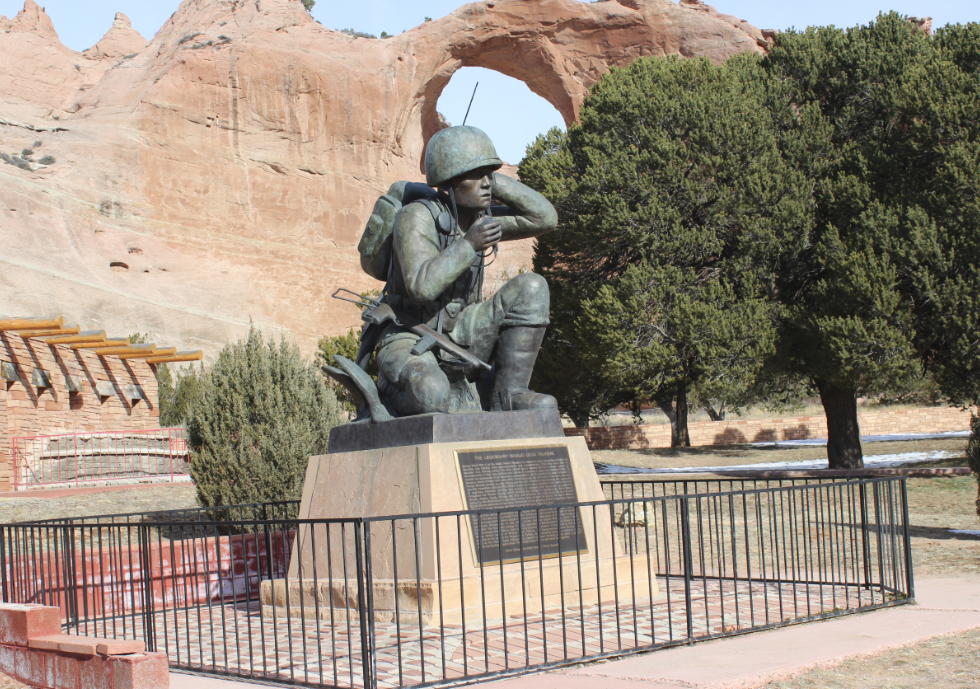
- Details
- By Levi Rickert
Opinion. Along the federal government’s “Road to Healing Tour” for Indian boarding school survivors, there were a lot of flags on display. Native American honor guards, at most tour stops, proudly presented the flag of the United States, eagle staffs and tribal nation flags.
These symbols were respectfully positioned near the table where Interior Secretary Deb Haaland (Laguna Pueblo) and Assistant Secretary - Indian Affairs Bryan Newland (Bay Mills Indian Community) listened to testimony from survivors or descendants of those who attended boarding schools over the past century.
Some might find a bit of irony in Native honor guards displaying such reverence for the United States flag, considering it was beneath this very banner that the federal government carried out a systematic program to destroy Native culture in the name of assimilation. This program, devised by an Army officer, operated with military-like tactics.
Still, Native Americans express deep respect for the military service of their relatives. At every powwow grand entries begin with thundering sounds of the drum, prompting Native American veterans carrying eagle staffs and flags, including the U.S. flag.
The reverence Native Americans have for the U.S. flag and their veterans cannot be ignored.
American Indians and Alaska Natives men and women serve in the armed forces at five times the national average, according to Alicia Madalena Sylvester (Jemez Pueblo), who is the Defense Department’s senior tribal advisor and liaison for Native American affairs.
Since September 11, 2001, about one-fifth of Native Americans—male and female—have served in the armed forces, in comparison to an average of 14% of all other racial/ethnic groups.
In issuing a Native American Heritage Month proclamation for the month of November, President Joe Biden referenced the service of Native Americans in the armed forces.
The president wrote: "Despite centuries of violence and oppression, Native peoples remain resilient and proud. Today, Native Americans are essential to the fabric of the United States. They serve in the United States armed forces at higher rates than any other ethnic group.
"They continue to steward so many of our great lands. Their contributions to science, humanities, arts, public service, and more have brought prosperity for all of us. Their diverse cultures and communities continue to thrive and lead us forward.”
Remarkably, even before American Indians became citizens of the United States in 1924, during World War I (July 28, 1914 – November 11, 1918), some 12,500 American Indians served in the armed forces. They fought for freedom when they weren’t even citizens of this country. Almost two-thirds of American Indians who served did so in the infantry, where they won widespread praise for bravery and achievement. Almost 5% of American Indian combat soldiers lost their lives, compared to 1% of American forces overall.
During World War I, approximately 400 students who attended Haskell Indian boarding school fought in the armed forces. The Indian Leader, Haskell’s weekly newspaper, reported regularly on the Haskell students’ involvement in the war.
Three decades later during World War II, Native Americans once again answered the call to duty. Using Indigenous languages that were forbidden in Indian boarding schools, Native Americans used traditional language to confuse and ward off the enemies. Navajo code talkers became legendary because their code was never broken. The Navajo code talker program is cited as a significant reason the United States won the war in the Pacific campaign.
Other tribes, including the Cherokee, Choctaw, Lakota, Meskwaki, and Comanche tribes participated in translating encrypted messages in their Indigenous languages on the front lines.
Thankfully, Indigenous languages persevere despite the physical punishment inflicted on Native children in Indian boarding schools when they were caught speaking their tribal languages.
During World War II, before Alaska was a state, more than 6,300 Alaska Natives volunteered to serve in what was known as the Alaska Territorial Guard. They came together to defend the United States from attack along the 6,640-mile coastline.
I am sometimes asked why Native Americans serve in the armed forces when the federal government throughout history has not treated our people kindly. I answered them with the explanation an Native elder told me: in defense of the land.
We know our people have been here since time immemorial. We appreciate the service of our ancestors who protected this land, and those Native Americans who continue to fight for our community and our freedom.
Thayék gde nwéndëmen - We are all related.
More Stories Like This
Tribes Seek Better Data, Real Accountability in MMIP Cases Ahead of Tribal ConsultationWhat Would Dr. King Say About ICE?
In Unity and Commitment
Protecting Our People through Human Trafficking Awareness
It is Time for Animal Behavior to Become Its Own Discipline
Help us defend tribal sovereignty.
At Native News Online, our mission is rooted in telling the stories that strengthen sovereignty and uplift Indigenous voices — not just at year’s end, but every single day.
Because of your generosity last year, we were able to keep our reporters on the ground in tribal communities, at national gatherings and in the halls of Congress — covering the issues that matter most to Indian Country: sovereignty, culture, education, health and economic opportunity.
That support sustained us through a tough year in 2025. Now, as we look to the year ahead, we need your help right now to ensure warrior journalism remains strong — reporting that defends tribal sovereignty, amplifies Native truth, and holds power accountable.
 The stakes couldn't be higher. Your support keeps Native voices heard, Native stories told and Native sovereignty defended.
The stakes couldn't be higher. Your support keeps Native voices heard, Native stories told and Native sovereignty defended.
Stand with Warrior Journalism today.
Levi Rickert (Potawatomi), Editor & Publisher

